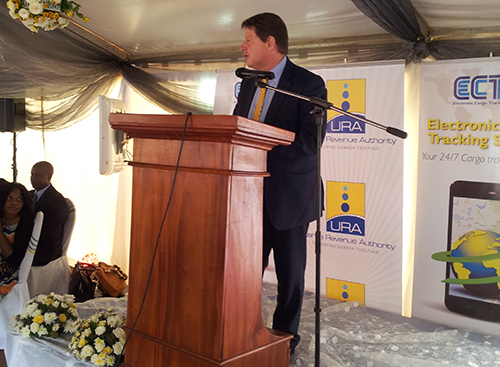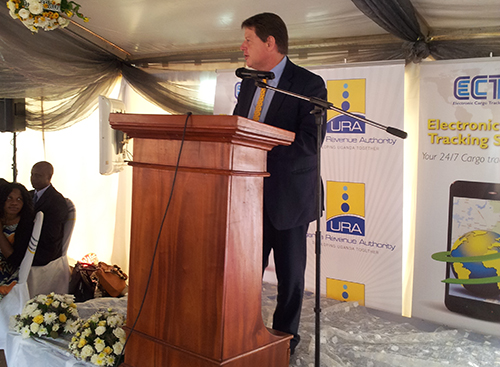Kampala – May 9th, 2014
Uganda Revenue Authority (URA) has launched an electronic system that helps owners of goods, clearing agents and transporters to monitor the location and status of their cargo while in transit.

The Electronic Cargo Tracking System (ECTS) will monitor imports, exports, re-exports and goods in transit to other countries in the region. It will greatly improve the process of managing goods in transit by providing real time feedback to the business community and URA, reduce transit time and the cost of doing business.
The US$5.2million system, was co-funded by the Government of Uganda in partnership with the World Bank and Trademark East Africa. The system, developed by B’SMART Technologies of Malaysia has been designed and customized to the needs of URA.
“When we started piloted in October 2013, the transit period through Uganda was seven days on average and has now been reduced to two days. This was partly because the drivers were making un-necessary stops along the journey. But now with electronic monitoring, this has changed. The system will track the movement of goods from the beginning to the end of the journey thereby enhancing security of international trade supply chain,” says Richard Kamajugo, URA Commissioner for Customs.
How ECTS works:
The ECTS relies on electronic tracking devices (e-Seals) which are fixed on a container or truck and constantly give real time feedback to the Customs officers at the Central Monitoring centre.
The system also has an interface that enables the owners of the goods and clearing agents to get real-time feedback on location of a vehicle, speed and status of the container, or whether the saels have been tampered with or not.
If the device transmits information that is contrary to that declared earlier, for example, goods being diverted or tampering of the e-seal, the URA Rapid Response teams deployed along the transit routes will quickly respond to the alert.
Before ECTS:
Before the system, URA had challenges that made ECTS inevitable. Among them was the diversion goods and the delays truck drivers took in transit. This necessitated URA to physically escort goods especially those of high revenue risk, which was inefficient, costly, time-consuming and required a lot of manpower. Owners of goods had to meet the costs of escort. As the volume of cargo grew, the physically escorting was not sustainable. For instance, over 10 years ago, URA received 400 trucks a day at Malaba border station. Today, the number has grown to 1200-1500. With increasing volumes of cargo and the drive to reduce the cost of doing business, this trend had to change.
Expected benefits to the business community:
- Following the removal of physical escorts and other associated transit costs, the business community will save up to Shs 3Bn per year, which is expected to translate into lower costs and ultimately consumer prices.
- Secure cargo while in transit enhances security of cargo and minimizing risks of theft
- Improved communication through the ECTS-trader interface is done will provide real information on status during transit and confirmation of arrival which will facilitate planning by the business community.
- Reduction of transit time
- Increased business turnover due to reduced transit time.
- Ability to manage and communicate with the transporter or driver via mobile devices and receive exceptional alerts anywhere and at any time.
Benefits to URA:
- Ability to monitor transit cargo on a real-time basis.
- Reduced incidences of diversion of cargo in transit
- Reduced compliance costs
- Better facilitation of International Trade
Change Management done:
Before the pilot in October 2013, at least 357 members of the business community – that is – transporters, Cargo owners and clearing agents – were trained about the system and its benefits. URA has also trained 585 Customs officers at border stations and those attached to bonds. The stakeholders have willingly embraced it.
For further details please contact the:
Mrs. Sarah Birungi Banage
ASSISTANT COMMISSIONER PUBLIC AND CORPORATE AFFAIRS
Tel: 0417 44 2049
Mobile: 0717 442 714
Source: TradeMark Africa (TMA)
TradeMark Africa (TMA) is an aid-for-trade organisation that was established with the aim of growing prosperity in East Africa through increased trade. TradeMark Africa (TMA) operates on a not-for-profit basis and is funded by the development agencies of the following countries: Belgium, Canada, Denmark, Finland, the Netherlands, UK, and USA. TradeMark Africa (TMA) works closely with East African Community (EAC) institutions, national governments, the private sector and civil society organisations.















